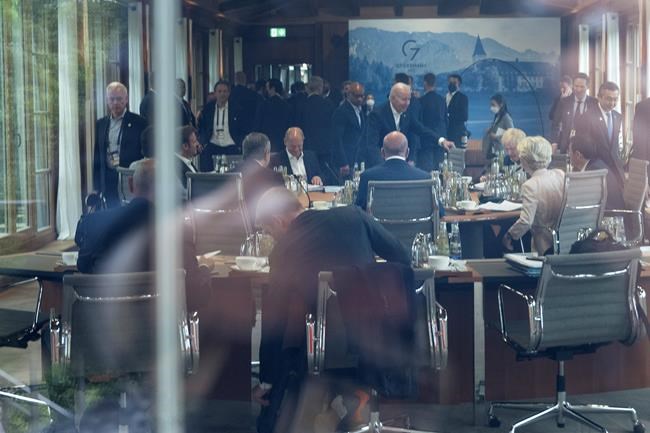G-7 aims to create club of nations to boost climate action
Advertisement
Read this article for free:
or
Already have an account? Log in here »
To continue reading, please subscribe:
Monthly Digital Subscription
$0 for the first 4 weeks*
- Enjoy unlimited reading on winnipegfreepress.com
- Read the E-Edition, our digital replica newspaper
- Access News Break, our award-winning app
- Play interactive puzzles
*No charge for 4 weeks then price increases to the regular rate of $19.00 plus GST every four weeks. Offer available to new and qualified returning subscribers only. Cancel any time.
Monthly Digital Subscription
$4.75/week*
- Enjoy unlimited reading on winnipegfreepress.com
- Read the E-Edition, our digital replica newspaper
- Access News Break, our award-winning app
- Play interactive puzzles
*Billed as $19 plus GST every four weeks. Cancel any time.
To continue reading, please subscribe:
Add Free Press access to your Brandon Sun subscription for only an additional
$1 for the first 4 weeks*
*Your next subscription payment will increase by $1.00 and you will be charged $16.99 plus GST for four weeks. After four weeks, your payment will increase to $23.99 plus GST every four weeks.
Read unlimited articles for free today:
or
Already have an account? Log in here »
Hey there, time traveller!
This article was published 28/06/2022 (1257 days ago), so information in it may no longer be current.
BERLIN (AP) — Members of the Group of Seven major economies pledged Tuesday to create a new ” climate club ” for nations that want to take more ambitious action to tackle global warming, putting them on a possible collision course with China.
The idea, championed by G-7 summit host German Chancellor Olaf Scholz, will see countries that join the club agree on tougher measures to reduce greenhouse gas emissions.
Countries that are part of the club will try to ensure their national measures are transparent and comparable, avoiding the need for members to impose climate-related tariffs on each others’ imports. The European Union in particular has touted such tariffs as a way to prevent companies which reduce emissions from being undercut by foreign rivals that don’t have to abide by strict environmental rules.

Speaking at the end of the three-day summit, Scholz said the aim was to “ensure that protecting the climate is a competitive advantage, not a disadvantage.”
The G-7 say that the new club will be “will be inclusive in nature and open” to countries that are committed to fully implementing the 2015 Paris climate accord, but the idea is likely to find little favor particularly with China, the world’s biggest emitter. Beijing has made clear that it strongly opposes climate-related tariffs and has tried to rally support against the idea from other emerging and developing countries.
Scholz said details of the planned climate club would be finalized this year.
The G-7 also made clear their continued support for efforts to cap global warming at 1.5 Celsius (2.7 Fahrenheit) this century compared to preindustrial times, outlining numerous measures they will take to curb their own emissions and help poorer nations do the same.
Environmental campaigners expressed relief that existing pledges to phase out coal use and boost the uptake of electric cars hadn’t been rolled back, though the G-7 did soften their commitments on ending public support for fossil fuel investments.
In their final statement following three days of talks in Elmau, the G-7 leaders said that because of the exceptional circumstances arising from the war in Ukraine, “publicly supported investment in the gas sector can be appropriate as a temporary response.”
Environmental campaigners, scientists and U.N. Secretary-General Antonio Guterres have urged rich, developed nations to end all public finance for fossil fuel projects, warning that these could lock in increased carbon emissions or become obsolete in just a few years.
Scholz, whose country has scrambled to find replacements for Russian natural gas supplies cut due to the war in Ukraine, defended the decision.
“Gas will be needed temporarily and that is why there may be investments that make sense, in this transition phase, and that therefore may need to be supported,” he told reporters after the summit.
One of the arguments made by German officials in favor of supporting new natural gas development projects is that this could prevent them having to resort to burning more polluting coal to meet their energy needs.
But experts said it is unclear whether investments in natural gas projects — such as one that Germany is considering supporting in Senegal — even make financial sense when countries have committed not to release any additional emissions into the atmosphere by mid-century.
“The simple truth is gas, oil and coal have got much more expensive while clean alternatives like wind and solar look an even better, and far cheaper bet,” said Gareth Redmond-King of the environmental think tank Energy and Climate Intelligence Unit. “It will be critical not to risk fossil fuel stranded assets that, by the time they come online, find the world has moved on towards net zero.”
___
Follow AP’s coverage of the G-7 summit at https://apnews.com/hub/g-7-summit and climate issues at https://apnews.com/hub/climate


